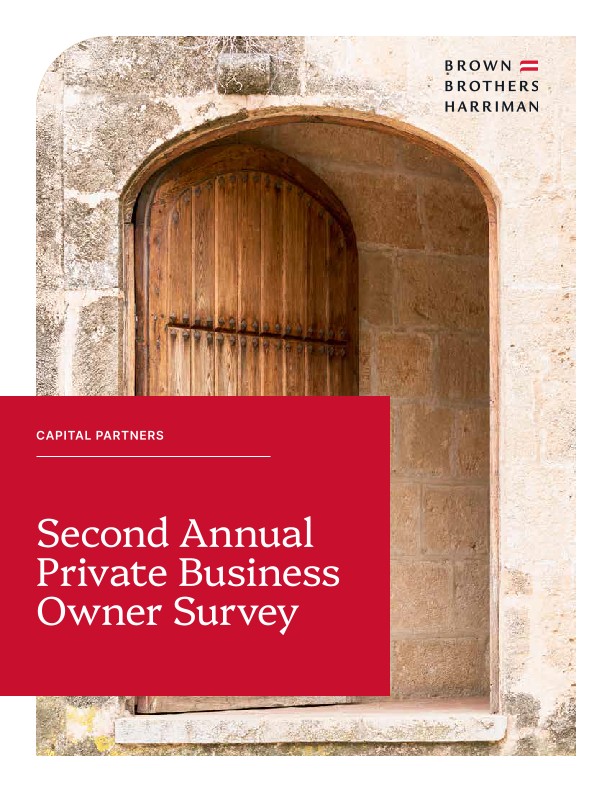Private businesses in the U.S. vary greatly in terms of size, sector, service, and product. So how do business owners plan for the future of their businesses and families based on common challenges?
- Governance structures
- Succession planning
- Long-term strategic objectives
- Capital needs
- Regulation and technology
- Strategies to handle complicated family dynamics (in some cases)
We set out to unearth how business owners think and feel about those challenges and opportunities and how it shapes how they run their enterprises.
Read the full report here.
In 2024, private businesses have had to grapple with geopolitical unrest in pockets of the word, volatility in the market, potential changes to the regulatory environment, an unprecedented presidential election season, and the evolution of how business is conducted and by who – or what. They face all this and keep their focus on the health and the future of their business.
When asked about their top three challenges, private business owners identified:
- Economic instability and inflation
- The rise of artificial intelligence
- The political environment in the U.S.
Economic cycles come and go, interest rates rise and fall, and presidential elections happen every four years. Artificial intelligence, on the other hand, is a paradigm shift, and the pace of progress in this area poses opportunities, challenges, and risks to businesses of all sizes.
Business owners are split as to whether there should be more AI regulation.
- 51% think AI regulations should stay the same
- 46% think the U.S. should enact more AI regulations
- 3% think there should be fewer AI regulations
Despite citing the rise of AI as a challenge, 99% are currently using AI for business purposes, including:
- Automating processes 47%
- Supply chain and inventory management 47%
- Marketing/Content creation 45%
- Security and fraud prevention 45%
- Customer service 45%
- Data and predictive analytics 42%
- Recruitment and retention 42%
And adoption will continue to grow, with business owners expecting to use AI in the following areas in the next 12 months:
- Data and predictive analytics 49%
- Marketing/Content creation 47%
- Automating processes 46%
- Customer service 45%
- Security and fraud prevention 45%
- Recruitment and retention 44%
- Supply chain and inventory management 41%
If you are interested in learning more about how we work with private business owners to help them achieve their business and personal goals throughout periods of change, contact our Corporate Advisory & Banking team.
Family businesses’ unique challenges
One of the most challenging issues that many business leaders face, especially owner-operators of private businesses, is the eventuality that one day their role as the leader will end. That shift could come as a result of a sale of their business(es), a deliberate transition of leadership to the next generation, illness, or death.
45% say the top reason they wouldn’t consider selling some or all of their businesses in the next 12 to 24 months is that they identify with their business too much to give it up
91% of private business owners say it’s important for their business to remain in the family for the next generation but
29% are still struggling to pick a successor
When it comes to succession, we help leaders not only acknowledge the impending major transition in their lives, but also focus on the journey ahead.
"By default, many private business owners focus on the destination, but it is important that the focus be set on how the transition is done," Kathryn continues. This is true whether business ownership is staying in a family or will be sold to a third party.
While 99% say they have taken steps to prepare the next generation to take over, 74% state that roles for the next generation are either not well-defined or not fully communicated.
Successor readiness is a common concern among business owners. To the extent that family business owners want family members to fill critical company positions, the departing leader must identify whether their role is fillable as presently designed. Responsibilities often require division and delegation across several roles (some new) rather than simply handing them down to a successor.
With a focus on maintaining dividend payments, for the second year in a row, 46%* of private business owners were willing to give up part or all of their control and ownership 35% were willing to sacrifice growth.
*Up 13 percentage points from 2023
If you are interested in learning more about how we work with family businesses to navigate the complexities surrounding family business ownership, contact our Center for Family Business.
The business of running a family
Those who don’t begin the process by defining the family’s goals and investment philosophy may struggle to find long-term success when it comes to the simplest requirements of a single family office – investment and manager selection and estate planning. In cases where single family offices are struggling to endure and facing challenges, looking outside for best-in-breed services and advice could help a family augment its solutions and set itself up to thrive for generations. The best path forward for a single family office is unique to each situation.
34% of private business owners rely on a single family office to manage their investable assets.
But single family offices are falling short of private business owners’ expectations, with the two biggest areas of concern being:
- 44% investment and manger selection
- 30% estate planning
Single family offices are navigating increasingly complex financial and personal landscapes, and even highly customized solutions can fall short of expectations. It’s a reminder that the evolving needs of families require a more holistic, adaptive approach – one that combines not only investment expertise, but also thoughtful planning across tax, estate, and philanthropic matters.
We are increasingly seeing that the role of the family in the single family office is also an important consideration.
74% plan to engage in additional estate planning in order to take advantage of the higher exemptions
16% plan to do nothing, citing their belief that higher exemptions will not be reduced
Private business owners have a unique opportunity to leverage the $13.61 million gift tax exemption by transferring interests in their business to beneficiaries, either directly or through trusts. Gifts of a noncontrolling business interest are often subject to valuation discounts, meaning a business owner can transfer more value for less gift tax exemption. The future growth on the business interest also occurs outside the owner’s taxable estate.
Leveraging the gift tax exemption to make gifts of private business interests is not only good tax planning, but can help ensure a successful business transition to the next generation if that is a goal.
If you are interested in learning more about how we work families to help them manage life’s complexities, contact our Multi-Family Office team.
Communicating about your wealth and your business
100% of private business owners say they have an estate plan and 91% say their plan is aligned with their values but 97% report there are factors that have prevented them from communicating their estate plan to family
A good starting point in overcoming these hurdles is understanding the values, or “why,” underpinning the estate plan. Starting with articulating what is most important provides a guide for decisions about wealth and planning, creates common ground among family members, and gives direction and purpose to decisions. Values are critical in creating a plan that meets a family’s objectives and allows for long-term success – and leading with values can even ease tensions and establish opportunities for close agreement, if not consensus, during difficult conversations.
Most business owners have estate plans aligned with their values but may face challenges of their family having differing values as it relates to the company’s mission.
And while their estate plan may align with their values…. 36% of private business owners say they have faced the challenge of family members having differing values as it relates to the company’s mission.
Most families share common values passed down through generations. This common ground, along with a commitment to robust and ongoing communication, is the cornerstone for long-term success. Throughout all of this, it is important to keep in mind that families who run successful businesses often worry about next generation members being taken advantage of due to their wealth.
38% of business owners are concerned that their family members could be taken advantage of because of their wealth.
The best way to engage the next generation early is to figure out where their passions and interests lie and then explore areas of the business to apply these passions. If the next generation feels a genuine connection to the business, they’re more likely to find purpose and meaning within it.
If you are interested in learning more about how we work with families to identify and communicate their values, contact a BBH relationship manager or wealth planner.
Who we surveyed
The BBH Private Business Owner Survey was conducted among 400 U.S. private business owners, excluding institutionally owned businesses or those owned by a fund, with quotas set for 100 respondents for each of the following enterprise value segments: $10 million to less than $50 million, $50 million to less than $150 million, $150 million to less than $500 million, and $500 million or more.
400 Private Business Owners
Enterprise value (clockwise)
- $10m to <$50m
- $50m to <$150m
- $150m to <$500m
- $500m+
Gender breakdown
- 73% male
- 27% female
Ownership tenure (in years)
- 0-5: 34%
- 6-10: 39%
- 11+: 27%
Methodology
The BBH Private Business Owner Survey was conducted by Wakefield Research among 400 U.S. private business owners, excluding institutionally owned businesses or those owned by a fund, with quotas set for 100 respondents for each of the following enterprise value segments: $10m to less than $50m, $50m to less than $150m, $150m to less than $500m, and $500m+, between July 22, and August 2, 2024, using an email invitation and an online survey.
Results of any sample are subject to sampling variation. The magnitude of the variation is measurable and is affected by the number of interviews and the level of the percentages expressing the results. For the interviews conducted in this particular study, the chances are 95 in 100 that a survey result does not vary, plus or minus, by more than 4.9 percentage points from the result that would be obtained if interviews had been conducted with all persons in the universe represented by the sample.
Contact Us
Brown Brothers Harriman & Co. (“BBH”) may be used to reference the company as a whole and/or its various subsidiaries generally. This material and any products or services may be issued or provided in multiple jurisdictions by duly authorized and regulated subsidiaries. This material is for general information and reference purposes only and does not constitute legal, tax or investment advice and is not intended as an offer to sell, or a solicitation to buy securities, services or investment products. Any reference to tax matters is not intended to be used, and may not be used, for purposes of avoiding penalties under the U.S. Internal Revenue Code, or other applicable tax regimes, or for promotion, marketing or recommendation to third parties. All information has been obtained from sources believed to be reliable, but accuracy is not guaranteed, and reliance should not be placed on the information presented. This material may not be reproduced, copied or transmitted, or any of the content disclosed to third parties, without the permission of BBH. All trademarks and service marks included are the property of BBH or their respective owners. © Brown Brothers Harriman & Co. 2024. All rights reserved. PB-07760-2024-09-23







